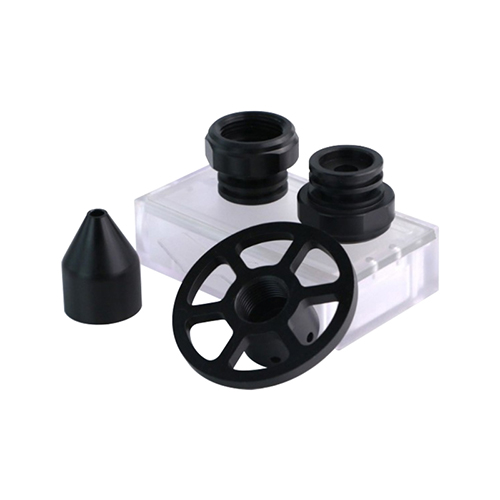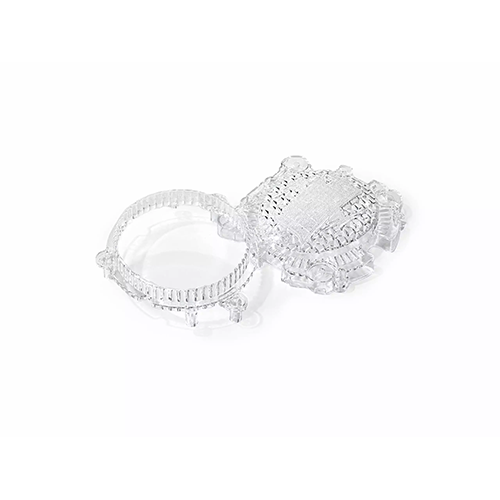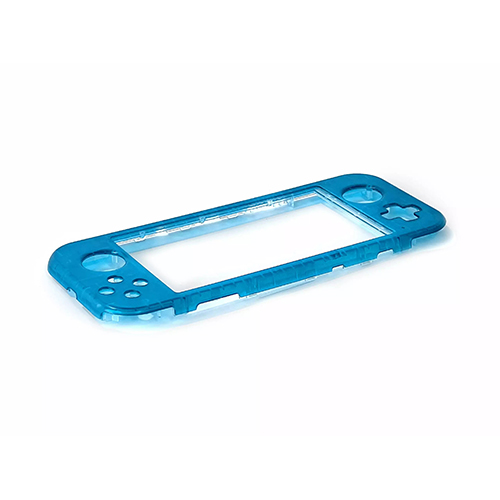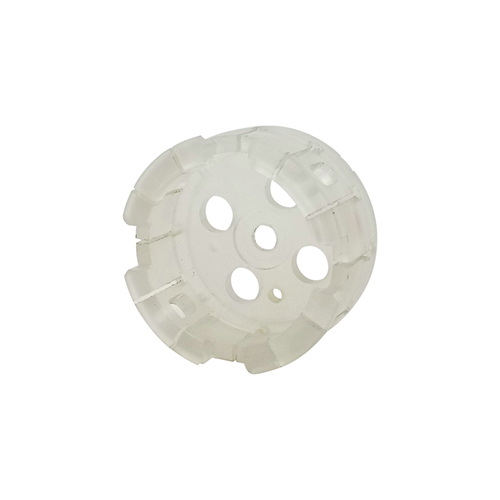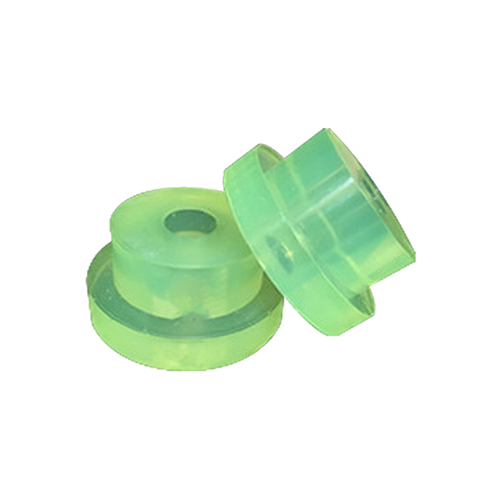Polycarbonate
Custom Polycarbonate Machining Service
NOBLE provides you with tailor-made precision polycarbonate CNC machining solutions, from rapid prototyping to production, so that you can get high-quality polycarbonate parts or prototypes within a few days. Request instant online delivery of polycarbonate CNC machined parts now, with a delivery time as short as 3 days.
- Advanced Equipment & Cost-Effective Price
- 10+ Years of Polycarbonate Machining Services
- ISO 9001 & ISO13485 Certified Factory
- Quote Within 24 hours
- High Quality and Consistency
- 100% Part Inspectio

Our Polycarbonate Machining Capabilities
NOBLE has strong manufacturing capabilities in its domestic factories in China, providing high-quality polycarbonate CNC machining solutions and a variety of excellent surface treatment options to meet your complex geometry and high-precision polycarbonate parts machining needs.
| Price | $$$ |
| Lead Time | <5 days |
| Wall Thickness | 1mm-5mm (Typical Wall Thickness);0.8mm-1mm (Thinner Walls); ≥10mm (Thicker Walls) |
| Tolerances | ±0.05mm |
| Max Part Size | 480mm x 751mm x 203mm |
| Available Polycarbonate at NOBLE | General Purpose Polycarbonate, Optical Grade Polycarbonate, UV-resistant polycarbonate, Flame-Retardant Polycarbonate, Glass-Filled Polycarbonate, Impact-Resistant Polycarbonate, High-Temperature Polycarbonate, Reinforced Polycarbonate, Transparent Polycarbonate |

Characteristics of Polycarbonate Machining Materials
Polycarbonate is a high-performance thermoplastic material known for its exceptional high-impact resistance, mechanical properties, electrical insulation properties, optical clarity, and thermal stability. However, it is susceptible to scratching, chemical sensitivity, and heat sensitivity during processing, requiring careful handling and processing techniques. With the right design considerations and CNC machining techniques, it is widely used to manufacture precision parts and products in a wide range of industries, from automotive and electronics to medical and consumer products. Understanding the properties of polycarbonate is essential to selecting the correct CNC machining technology and application.
| Features | Info |
| Subtypes | General Purpose Polycarbonate (GPPC), Impact-Resistant Polycarbonate, Flame-Retardant Polycarbonate, Glass-Filled Polycarbonate, Optical Grade Polycarbonate |
| Process | Injection Molding, Extrusion, Blow Molding, Thermoforming, Casting |
| Tolerance | ±0.05mm |
| Applications | Automotive, Electronics, Medical Devices, Optical Lenses, Consumer Goods, Construction |
| Finishing Options | Polishing, Laser Engraving, Painting, Texturing, Coatings, Heat Treating |
Pros and Cons of Polycarbonate for CNC Machining
Polycarbonate is a high-performance material with excellent impact resistance, optical clarity, and thermal stability. Its machinability, strength, and lightweight properties make it an ideal choice for precision CNC machined parts. It is widely used in industries such as automotive, aerospace, medical, and electronics. However, polycarbonate also faces some challenges, including heat sensitivity during CNC machining, susceptibility to surface scratches, limited chemical resistance,e and UV degradation. These issues can be mitigated with the right CNC machining techniques, coatings, or alternative formulations.
High Impact Resistance
Polycarbonate is exceptionally durable and resistant to impact, making it ideal for products requiring strength and toughness, such as protective covers, automotive parts, and safety equipment. It maintains integrity even under stress or impact during CNC machining.
Optical Clarity
Polycarbonate offers excellent transparency and light transmission, making it perfect for applications like lenses, light covers, and displays. It allows for clear, high-quality visuals, crucial in industries like optical, electronics, and signage.
Thermal Stability
Performs well in a wide temperature range, maintaining its shape and strength without significant distortion. This makes it suitable for applications where temperature fluctuations are common, such as automotive, aerospace, and industrial equipment.
Ease of Machining
Polycarbonate is relatively easy to machine with CNC technology, offering smooth finishes and precise cuts. It can be milled, drilled, or shaped without significant difficulty, enabling cost-effective and efficient production for complex parts.
Versatility
This material is highly versatile, and used in various applications across industries such as automotive, electronics, healthcare, and construction. It can be easily customized to meet specific design requirements, from structural components to aesthetic parts.
Lightweight
Polycarbonate is much lighter than metal while maintaining high strength. This makes it an ideal material for applications that require weight reduction without sacrificing performance or durability, mainly used in CNC machining of aviation parts, automotive parts, and consumer goods such as glasses or luggage.
Electrical insulation properties
Polycarbonate is a good electrical insulator and resists electric current. This makes it suitable for electrical components and parts that require electrical insulation. Mainly used in CNC machining electrical connectors, circuit board housings and insulation electrical connectors, circuit board housings, and insulation barriers to protect sensitive electronic components from electrical interference.
Good dimensional stability
Polycarbonate has good dimensional stability, which means that it can maintain its shape well over time even under different temperature and environmental conditions. This ensures that CNC machined parts maintain their precision and tolerances throughout their life cycle. Widely used in high-precision CNC machining of medical parts, industrial machinery parts, and consumer electronics, ensuring that the parts remain functional and accurate even after long-term exposure to various factors such as temperature or humidity.

Prone to Scratching
Despite its toughness, polycarbonate can scratch easily, which may affect the aesthetics and function of finished parts. To maintain surface quality, extra care is needed during handling, CNC machining, and post-processing.
High Cost
Polycarbonate tends to be more expensive than other plastics, which can increase the overall cost of manufacturing. This is especially important in large-scale production runs, where material cost savings are crucial for profitability.
Thermal Expansion
Polycarbonate has a relatively high coefficient of thermal expansion, meaning it can expand and contract with temperature changes. This can affect precision and dimensional stability in parts exposed to varying environmental conditions.
UV Degradation
Without UV inhibitors, polycarbonate is susceptible to yellowing and degradation when exposed to prolonged sunlight. For outdoor applications, special UV-resistant grades or coatings are required to maintain their clarity and mechanical properties over time.
Chemical Sensitivity
Polycarbonate can be damaged by exposure to certain chemicals, such as strong acids, alkalis, and solvents. Careful material selection is necessary in environments where the part may come into contact with these substances.
Surface Scratches and Damage
Polycarbonate is susceptible to scratches and surface damage, especially in applications where CNC-machined parts are subject to friction or wear. The material is relatively soft compared to metals, so any abrasive contact can cause visible scratches. Choosing the right CNC machining method can polish or coat parts to improve scratch resistance. In addition, using softer tools or abrasives and ensuring that parts are properly treated can help reduce surface damage.
Limited Chemical Resistance
Polycarbonate has limited resistance to certain chemicals, including strong acids, bases, and organic solvents. Prolonged exposure to harsh chemicals can degrade the material, causing discoloration, cracking, or loss of mechanical properties. The solution is that for environments with chemical exposure, polycarbonate can be treated with special coatings, or alternative materials with better chemical resistance can be used.
High CNC Machining Costs
Polycarbonate has limited resistance to certain chemicals, including strong acids, bases, and organic solvents. Prolonged exposure to harsh chemicals can degrade the material, causing discoloration, cracking, or loss of mechanical properties. The solution is that for environments with chemical exposure, polycarbonate can be treated with special coatings, or alternative materials with better chemical resistance can be used.
Warping Risk
Like many plastics, polycarbonate is susceptible to warping or dimensional changes if exposed to uneven temperatures during or after processing. Solution: Proper cooling techniques during CNC machining and controlled storage conditions can minimize the risk of warping. Additionally, thicker sections of polycarbonate are less prone to warping than thin-walled sections.

Types of Polycarbonate Machining Materials
Polycarbonate is a widely used thermoplastic that comes in many types, each with unique properties that are suitable for different applications. Choosing the right type of CNC-machined polycarbonate can help you solve your problems with less effort. NOBLE has the unparalleled engineering expertise to provide you with tailor-made polycarbonate CNC machining solutions, ensuring that you get high-quality polycarbonate CNC machined parts quickly.

General Purpose Polycarbonate
General Purpose Polycarbonate (GPPC) is a versatile, durable thermoplastic known for its high impact resistance, optical clarity, and ease of fabrication. It offers a balance of mechanical properties, thermal stability, and electrical insulating capabilities, making it suitable for a wide range of applications in industries like automotive, electronics, and consumer goods.
Tensile Modulus(MPa): 2,400 – 2,500 MPa
Tensile Strain (Yield): 6-8%
Rockwell Hardness(M-Scale and R-Scale): M75 – M85, R110 – R115
Heat Deflection Temperature(℉): 280°F

Optical Grade Polycarbonate
Optical Grade Polycarbonate is specially engineered for applications requiring exceptional optical clarity and transparency. This material is highly regarded in industries such as eyewear, optical lenses and displays because it combines high light transmission, resistance to yellowing and impact strength, making it a reliable choice for CNC machining to produce precision optical components.
Tensile Modulus(MPa): 2400 MPa
Tensile Strain (Yield): 6%
Rockwell Hardness(M-Scale and R-Scale): M75, R110
Heat Deflection Temperature(℉): 280°F

UV-Resistant Polycarbonate
UV-Resistant Polycarbonate incorporates additives that protect the material from ultraviolet (UV) degradation, ensuring longer service life when exposed to outdoor conditions. This variant maintains its mechanical properties, clarity, and dimensional stability even in harsh sunlight, making it ideal for applications such as outdoor signage, skylights, and protective covers.
Tensile Modulus(MPa): 2400 MPa
Tensile Strain (Yield): 6%
Rockwell Hardness(M-Scale and R-Scale): M75, R110
Heat Deflection Temperature(℉): 280°F

Flame-Retardant Polycarbonate
Flame-Retardant Polycarbonate is formulated with fire-resistant additives that reduce flammability and self-extinguish when exposed to flame. This enhanced safety feature makes it suitable for electrical and electronic housings, lighting fixtures, and automotive components, where fire safety and compliance with stringent regulations are essential.
Tensile Modulus(MPa): 2300 MPa
Tensile Strain (Yield): 6-7%
Rockwell Hardness(M-Scale and R-Scale): M75 – M85, R110
Heat Deflection Temperature(℉): 270°F

Glass-Filled Polycarbonate
Glass-Filled Polycarbonate is reinforced with glass fibers, improving its mechanical strength, rigidity, and thermal stability. This composite material is ideal for high-performance applications that require increased structural support, such as in automotive, industrial, and electrical components, offering enhanced load-bearing capacity and resistance to deformation under stress.
Tensile Modulus(MPa): 4500-5000 MPa
Tensile Strain (Yield): 3-5 %
Rockwell Hardness(M-Scale and R-Scale): M90 – M100, R120 – R130
Heat Deflection Temperature(℉): 320°F

Impact-Resistant Polycarbonate
Impact-Resistant Polycarbonate is engineered for superior toughness and resistance to physical impact. Known for its ability to withstand harsh conditions, this material is widely used in safety equipment, eyewear, protective covers, and automotive parts, where durability and protection against high-impact forces are crucial.
Tensile Modulus(MPa): 2,200 – 2,400 MPa
Tensile Strain (Yield): 7-8 %
Rockwell Hardness(M-Scale and R-Scale): M70 – M85, R110
Heat Deflection Temperature(℉): 270°F

High-Temperature Polycarbonate
High-Temperature Polycarbonate is designed to maintain its structural integrity and performance in extreme heat environments. It offers excellent thermal stability and resistance to heat distortion, making it ideal for applications in the automotive, electronics, and aerospace industries where components are exposed to high temperatures.
Tensile Modulus(MPa): 2,500 MPa
Tensile Strain (Yield): 6-7 %
Rockwell Hardness(M-Scale and R-Scale): M75,R115
Heat Deflection Temperature(℉): 330°F

Reinforced Polycarbonate
Reinforced Polycarbonate combines the strength of polycarbonate with various reinforcing agents such as glass fibers or mineral fillers during CNC machining, enhancing its mechanical properties. This type of polycarbonate offers improved stiffness, dimensional stability, and resistance to wear, making it suitable for demanding industrial applications like gears, bearings, and housings.
Tensile Modulus(MPa): 4,000 – 5,500 MPa
Tensile Strain (Yield): 4-6 %
Rockwell Hardness(M-Scale and R-Scale): M90 – M105, R120 – R130
Heat Deflection Temperature(℉): 320°F
Surface Finishing Options for Polycarbonate Machining
NOBLE offers a range of surface treatments as part of its polycarbonate CNC machining services to enhance the quality of each CNC machined part. Each surface treatment is tailored to enhance the mechanical properties and appearance of your polycarbonate part.

Polishing
Working on metal and hard plastics, our polishing uses highly efficient machinery to get our parts between Ra 0.8~Ra0.1 for a cleaner surface.

Electroplating
Electroplating reduces metal cations in the electrolyte solution, producing a metallic coating on a metal surface. This process can be used for purposes of corrosion and wear resistance, as well as for decorative purposes.

Powder coating
We apply a thin layer of protective polymer with the corona discharge phenomenon to give our part a lasting finish that protects from impacts and prevents wearing down.

Sand Blasting
Band blasting cleans the surface of any impurities and peels coating through the propelling of blast media streams over the parts.

Laser Carving
Helpful in brand recognition or parts organization, we use laser carving that applies various printing methods during full-scale production to quickly embed barcodes, lettering and logos on the parts.
Custom Polycarbonate Machining Parts Display
Check out our over ten years of custom Polycarbonate machining Parts, including precision Polycarbonate prototypes and parts from our valued customers.
Applications of Polycarbonate CNC Machining
Polycarbonate is commonly used for CNC machining due to its durability, optical clarity, and lightweight, and has been successfully made into high-precision CNC machined parts to meet the complex machining needs of different customers. I t is a very effective method. The material combines durability, optical clarity, and lightweight, making it an ideal choice for applications that require impact resistance, transparency, and dimensional stability. Polycarbonate is a versatile, high-performance thermoplastic. By leveraging the advantages of polycarbonate in CNC machining, manufacturers can produce high-quality functional components to meet the needs of a variety of industries. It is widely used in industries where these properties are critical, such as automotive, aerospace, medical, electronic, and consumer products.

Automotive Parts
Polycarbonate CNC machining is used for headlamp lenses, interior trim panels, and impact-resistant parts of automobiles, which have durability, transparency, and strength, and are an ideal choice for automobile applications requiring high performance and safety.

Medical Devices
Polycarbonate's clarity, biocompatibility, and strength make it suitable for CNC-machined medical devices like surgical instruments, diagnostic equipment, and protective housings, ensuring precision and reliability in critical healthcare applications.

Consumer Electronics
Polycarbonate is widely used in CNC machining to produce eyewear lenses, including prescription glasses, food storage containers, cookware, safety glasses, and sunglasses, due to its impact resistance, optical clarity, and lightweight properties. This is due to the fact that polycarbonate is resistant to scratches, impacts, and high temperatures, making it an ideal material for consumer products that need to withstand wear and tear and frequent use.

Aerospace Parts
Polycarbonate is CNC-machined for aerospace applications such as cockpit windows, instrument covers, and protective shields. Its strength, lightweight, and thermal stability are very important to the parts exposed to extreme environmental conditions.

Electronics Enclosures
CNC-machined polycarbonate is used for electronic enclosures, housings, and connectors, providing excellent electrical insulation, durability, and ease of fabrication, making it ideal for protecting sensitive electronic components.

Industrial Parts
Polycarbonate is CNC-machined for industrial components like gears, bearings, and bushings, providing strength, wear resistance, and dimensional stability for mechanical systems that require reliable, high-performance parts.
If you are looking for a rapid prototyping manufacturer or a CNC machine shop to fabricate small, medium-volume, or mass-production products, NOBLE is an ideal choice.Our well-trained and experienced staff manufactures parts in line with drawings on modern CNC machines, with the highest accuracy and processing quality in all sizes.In addition, we provide professional design considerations for your CNC machining projects.
Want to get the most professional and fastest service for your CNC machining project? Upload your CAD files now and obtain a quote!

